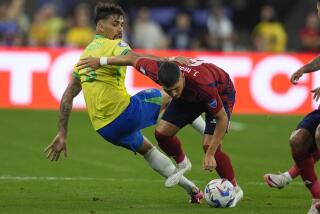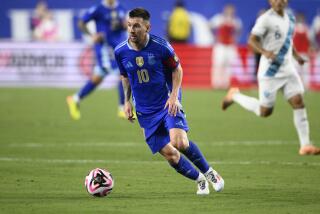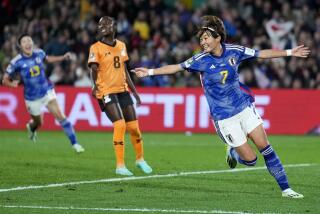Brazil shows South America’s soccer strength
- Share via
Reporting from Johannesburg, South Africa — The next World Cup will be played in South America.
Most of the rest of this one will be played by South America.
Even before Brazil’s 3-0 win over Chile on Monday at Ellis Park, South American teams were guaranteed spots in three of the four quarterfinals. And if Paraguay beats Japan in its round-of-16 game Tuesday, four South American teams will be among the final eight.
That leaves open the possibility of all-South American semifinals — which has never happened — and an all-South American final, which hasn’t happened in 60 years.
Just don’t ask anyone to explain why the continent is suddenly the most dominant on Earth at Earth’s most popular game.
“I don’t really know,” said Chile’s normally thoughtful Marcelo Bielsa, the only South American coach who has lost in this tournament. “I simply prefer to say nothing because I don’t know what to say.”
Brazilian striker Robinho was no more enlightening.
“I can’t tell you why that has happened,” he said. “South America has evolved very well to the attacking soccer that is being played today. We also mark well.
“But it is a very aggressive soccer.”
Very successful, too.
In fact, Monday’s matchup wasn’t so much a game as it was a clinic, with Brazil taking control on first-half goals from Juan and Luis Fabiano that came three minutes apart. It then put the game away 14 minutes into the second half when Robinho buried a 20-foot shot just inside the far post.
If it was a prizefight, Bielsa admitted he would have thrown in a towel from his corner.
“Brazil’s superiority was too much for us. We were unable to slow them down,” he said. “It’s hard to adapt to an opponent when there’s such a big gap in quality.”
And guess what. Brazil can get better.
“We have to improve in all facets of our play,” Brazil Coach Dunga said.
That’s because this is the time when the pressure starts to build. And no one feels it more than Brazil, which went into the World Cup among the favorites and has done nothing to change that perception.
“Given the quality of the Brazilian players, there is always this expectation that Brazil will be the winners,” said Dunga, who won a World Cup as a player with Brazil. “But being the favorite doesn’t mean you will win the World Cup.
“Every World Cup provides its own experience, which we bring with us.”
Brazil got the only goal it would need in the 35th minute when center-back Juan got well above the crowd in front of the net on a corner kick, heading the ball into the upper-left corner.
Fabiano doubled the lead minutes later, taking a touch pass from Kaka and rounding the goalie before pushing the ball into the open net.
And with Chile managing only three shots on goal — only one of which was a real threat — that 2-0 lead must have looked like a mountain to Bielsa’s team.
“Brazil manages to score every third attack,” Bielsa said.
Robinho added a goal anyway, his first in a World Cup, early in the second half after a strong run from midfield by Ramires, who took three defenders to him. So when Ramires laid the ball off to Robinho on his left, he had a clear shot and didn’t miss.
Up next for the five-time World Cup champions is the Netherlands, which got by Slovakia on Monday. The Dutch are one of three European teams in the quarterfinals, although Dunga suggested that was misleading.
“Their soccer is very similar to South American soccer,” he said of the Netherlands. “Their players are very technically able and we have to be ready to deal with this.”
A couple of more geographic notes also favor Brazil. No European team has won a World Cup played outside Europe. And in three of the four Cups played in years that end in zero — 1930, 1950, 1970 and 1990 — South American teams have won.
Plus as the field in this World Cup gets smaller, Dunga says, the games get more open, two other things that also favor his team.
“In these World Cup games we have to go forward and play open football. That’s what everyone wants to see,” he said. “I’ve always said that my players have the liberty to play.”
More to Read
Go beyond the scoreboard
Get the latest on L.A.'s teams in the daily Sports Report newsletter.
You may occasionally receive promotional content from the Los Angeles Times.







